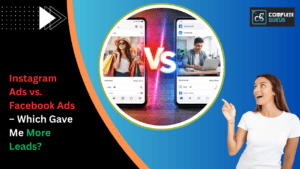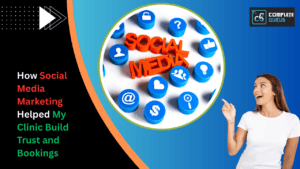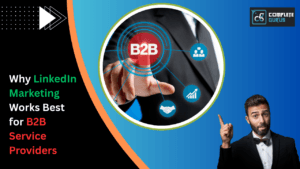Introduction to Marketing Automation
In the rapidly evolving landscape of business, staying ahead of the competition requires innovative strategies. One such strategy that has gained significant traction is marketing automation. In this digital age, where time is of the essence, automating repetitive tasks not only saves time but also allows businesses to focus on strategic initiatives. Marketing automation is not just a trend; it has become a necessity for companies looking to thrive in 2024 and beyond.
To learn more about Marketing, please click the link to our New blog post, “Facebook Vs. Instagram Ads: Which Is The Ideal Choice For Your Business Growth?”
Key Trends Shaping Marketing Automation in 2024
As we step into 2024, several key trends are shaping the landscape of marketing automation. Artificial Intelligence (AI) and machine learning are playing a pivotal role in enhancing the capabilities of automation tools. These technologies enable marketers to analyze vast amounts of data, providing insights into customer behavior and preferences. Personalized marketing, fueled by AI, is becoming the norm, allowing businesses to create targeted and relevant campaigns.
Moreover, the integration of marketing automation with other business systems, such as customer relationship management (CRM) and e-commerce platforms, is on the rise. This seamless integration ensures a unified approach to customer interactions, from lead generation to post-purchase engagement. The emphasis on omnichannel marketing is another trend, recognizing the importance of a consistent brand experience across various touchpoints.
Strategies for Successful Implementation
While the benefits of marketing automation are evident, successful implementation requires a well-thought-out strategy. Begin by clearly defining your objectives and understanding the specific needs of your business. Identify key performance indicators (KPIs) that align with your goals, whether it’s increasing lead generation, improving customer retention, or streamlining internal processes.
Choose an automation platform that aligns with your business requirements. Consider factors such as scalability, ease of integration, and the level of customization the platform offers. Training your team is equally important; ensure that your staff is well-versed in using the chosen automation tools to maximize their effectiveness.
Impact of Marketing Automation on Customer Engagement
One of the primary advantages of marketing automation is its positive impact on customer engagement. Automation allows for personalized communication at scale, tailoring messages to individual preferences and behaviors. Automated email campaigns, for instance, can deliver relevant content based on the recipient’s past interactions with your brand, increasing the likelihood of conversion.
Beyond personalized communication, marketing automation enables timely and contextually relevant interactions. Automated workflows can trigger responses based on specific customer actions, ensuring that your business remains engaged with prospects and customers throughout their journey. This heightened level of engagement not only fosters brand loyalty but also contributes to increased customer satisfaction.
Enhancing Lead Generation through Automation
Lead generation is the lifeblood of any business, and marketing automation significantly enhances this crucial aspect. By leveraging automation tools, businesses can capture, nurture, and qualify leads more efficiently. Automated lead scoring systems can prioritize leads based on their level of engagement, allowing sales teams to focus their efforts on prospects with the highest potential.
Automation also streamlines the lead nurturing process by delivering targeted content to leads at different stages of the sales funnel. Drip campaigns, for example, can provide a continuous flow of relevant information, gradually guiding leads towards conversion. The result is a more efficient and effective lead generation process that aligns with the expectations of today’s digitally savvy consumers.
Optimizing Sales Processes with Automation Tools
Effective sales processes are the lifeblood of any business, and marketing automation tools play a pivotal role in streamlining and enhancing these processes. From lead generation to closing deals, automation tools offer a range of functionalities that significantly boost efficiency and productivity.
Personalization and Targeting in Marketing Automation
One of the standout features of marketing automation is its ability to personalize and target communications. In 2024, consumers expect a personalized experience, and automation tools enable businesses to tailor their messaging based on customer behaviors, preferences, and demographics. This personalized approach not only improves customer engagement but also increases the likelihood of successful sales conversions.
Measuring Success: Analytics and KPIs in 2024
Implementing marketing automation is not a one-time endeavor; it requires ongoing monitoring and analysis. This section explores the key performance indicators (KPIs) and analytics tools crucial for assessing the success of your automation efforts. From conversion rates to customer retention metrics, understanding and leveraging data is essential for continuous improvement.
Overcoming Challenges in Marketing Automation Adoption
While the benefits of marketing automation are immense, businesses often face challenges in the adoption process. Common issues include integration complexities, staff training, and ensuring alignment with overall business goals. This section provides insights into overcoming these challenges, offering practical solutions for a smoother adoption journey.
Case Studies: Real-world Examples of Business Enhancement
To illustrate the tangible impact of marketing automation on sales processes, we present real-world case studies. These examples showcase how diverse businesses across industries have successfully implemented automation tools to optimize their sales funnels, increase conversion rates, and achieve sustainable growth. Learning from these experiences provides valuable insights for businesses considering or in the early stages of automation implementation.
Case Study 1: Streamlining Lead Management
Company XYZ, a B2B software provider, implemented marketing automation to streamline their lead management process. By automating lead scoring and nurturing, they reduced the time it took for leads to move through the sales funnel. The result was a 30% increase in lead-to-customer conversion rates within the first six months.
Case Study 2: Enhancing Customer Engagement
E-commerce giant ABC utilized marketing automation to enhance customer engagement. Through personalized email campaigns and targeted promotions, they not only increased customer satisfaction but also saw a notable uptick in repeat purchases. Automation allowed them to stay top-of-mind with their customer base, fostering long-term loyalty.
Case Study 3: Accelerating Sales Cycles
In the highly competitive tech industry, Company PQR implemented automation to accelerate their sales cycles. By automating follow-up communications and integrating their CRM system with marketing automation tools, they reduced the average sales cycle duration by 20%. This not only increased revenue but also allowed their sales team to focus on high-value opportunities.
Emerging Technologies in Marketing Automation
Advancements in artificial intelligence (AI) and machine learning are at the forefront of shaping the future of marketing automation. These technologies are enabling marketers to create more sophisticated and personalized campaigns. AI-driven algorithms analyze vast amounts of data to predict customer behavior, allowing for highly targeted and relevant messaging.
Additionally, the integration of augmented reality (AR) and virtual reality (VR) into marketing automation tools is providing immersive experiences for customers. This not only enhances engagement but also opens up new avenues for creative and interactive marketing campaigns.
Future Outlook: Evolving Possibilities in 2024 and Beyond
Looking beyond 2024, the future of marketing automation holds even more exciting possibilities. One notable trend is the increasing integration of Internet of Things (IoT) devices with marketing automation platforms. Marketers can leverage data from connected devices to gain deeper insights into customer preferences and behavior, allowing for more precise targeting and personalized experiences.
Blockchain technology is also making its mark in marketing automation. By ensuring transparency and security in data transactions, blockchain has the potential to address privacy concerns and build trust between businesses and consumers. This technology can revolutionize how customer data is handled and shared in marketing campaigns.
As marketing automation continues to evolve, predictive analytics will play a crucial role in optimizing marketing strategies. Predictive analytics uses historical data and machine learning algorithms to forecast future trends, enabling marketers to make informed decisions and stay ahead of the competition.
The rise of voice search and smart assistants is another dimension that marketers need to consider in their automation strategies. Optimizing content for voice queries and integrating with voice-activated devices will become essential for maintaining visibility in this rapidly growing segment of the market.
Suggested reading: How Google Ads Is The Best Option For Healthcare Businesses To Grow Exponentially
In conclusion, the transformative power of marketing automation in 2024 cannot be overstated. As businesses navigate the dynamic landscape of digital marketing, the implementation of sophisticated automation tools emerges as a pivotal strategy for enhancing overall efficiency and productivity. From streamlining repetitive tasks to fostering personalized customer interactions, marketing automation proves to be the catalyst for growth and success in the contemporary business realm.
To truly harness the full potential of marketing automation and ensure seamless integration within your business operations, consider enlisting the expertise of dedicated professionals. Hiring a marketing automation expert from Complete Gurus, Starting at $3 per hour, not only unlocks a cost-effective solution but also brings in a wealth of knowledge and experience. These experts are adept at tailoring automation strategies to align with your specific business goals, optimizing processes, and driving tangible results. In a landscape where time is of the essence and precision is paramount, the investment in a skilled marketing automation expert becomes a strategic imperative, propelling your business towards sustained growth and competitiveness in the ever-evolving market of 2024.

I am Ashutosh – a seasoned digital marketer, bringing digital transformation to businesses, complementing businesses’ growth via generating qualified leads, drive site inbound traffic via organic and inorganic approach, & build their brands through useful, well-designed marketing strategies and Marketing Automation implementation via Chat GPT, HubSpot & Zoho.







